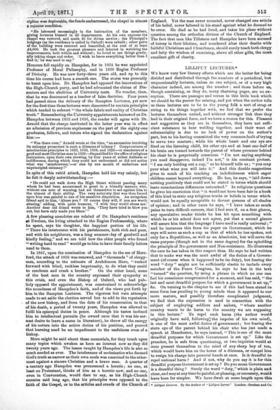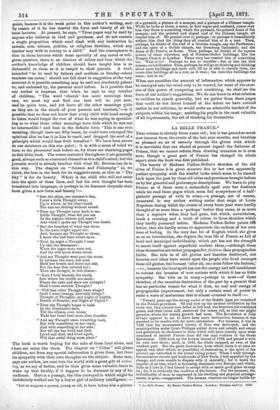LILLIPUT LECTURES.*
WE know very few literary efforts which are the better for being divided and distributed through the numbers of a periodical, hub unquestionably lectures, unless on one subject, or of a very high character indeed, are among the number ; and those before usy though containing, as they do, many charming pages, are no ex- ception. There are passages and verses in this little book which we should be the poorer for missing, and yet when the author tells us these lectures are to be to the young folk a sort of strap or string to tie things together with, we feel that we prefer the lectures themselves untied, and without stronger link than they had in their original form, and we have a reason for this. Pleasant and suggestive as they are in themselves, they have not suffi- cient substance to bear welding together, and their want of substantiality is due to no lack of power on the author's part, but to his having committed the very common fault of trying to serve two masters ; while his whole heart and one eye are. fixed on the listening child, his other eye and at least one-half of his brain are turned towards the parent of whose presence behind his chair he is perpetually conscious. "I'm not saying anything you need disapprove, indeed I'm not," is his constant protest. "I am only holding out a cup," as he himself tells us ; "you may pour what wine you will into it." And this double magnetism gives to much of his teaching an indefiniteness which eager children resent beyond everything. He has, he says, "laid down nothing positively that could not be stated in terms which should leave conscientious differences untouched." In religious questions he gives his conviction that "it would not have been fair in a book of this kind to state any religious truths or beliefs in terms which would not be equally acceptable to devout persons of all shades of opinion ; and in other cases he says, "I have taken so much pains to turn difficult corners, that I feel sure if, on a first glance, any speculative reader thinks he has hit upon something with which he or his school does not agree, yet that a second glance will assure him that the language I have used is really universal ; and he instances this from his paper on Government, which he says will serve as such a cup as that of which he has spoken, not only for a Republican, as well as an Absolutist, but will serve the same purpose (though not in the same degree) for the upholding the principle of No-government and Non-resistance. He illustrates the care he has taken in this respect thus. He says he had written that to make war was the most awful of the duties of a Govern- ment (of course when it happened to be its duty), but fearing the word " duty " might not be sufficiently elastic to include every member of the Peace Congress, he says he has in the text. "turned" the question, by using a phrase in which no one can feel his conscience compromised for a moment, and has said, "the last and most dreadful purpose for which a government is set up," &e. On turning to the chapter to see if this had been stated in some form less puzzling to young minds than it appeared to our more mature, and possibly therefore complicated judgment, we find that the expression is used in connection with the subject of employing soldiers and sailors, "where another country wants to do harm to the country we are supposing in this lecture." To repel such harm (the author would originally have said, following) the impulse of his own mind), is one of the most awful duties of government ; but fearing the stern eye of the parent behind his chair who has just made a speech at Manchester, he says instead, "This is one of the most dreadful purposes for which Government is set up." Like the preacher, he is safe from questioning, or two inquiries would at once present themselves to the mind of any sharp boy of ten, which would leave him on the horns of a dilemma, or compel him to resign his charge into parental hands at once. Is it dreadful to repel national harm ? And if not, why do you say it is for this dreadful purpose Government is setup? Do you mean Government is a dreadful thing ? Surely the word "duty," which is plain and clear, and may at any time be painful, or pleasing, or necessary, would have been far simpler. We have dwelt at some length upon this • Lilliput Lectures. By the Author of " Litliput Levee." London: Bush= and Co. point, because it is the weak point in this author's writing, and by reason of it he has marred the force and beauty of all his later lectures. At present, he says, "These pages may be used by anyone who believes in God and goodness, and do not contain a single proposition which need clash with any instruction in morals, arts, science, politics, or religious doctrine, which any teacher may wish to convey to a child." And the consequence is that in those lectures which treat specially of any moral or reli- gious question, there is an absence of colour and tone which the author's knowledge of children should have taught him is as distasteful to them as it is insipid to their parents. A work intended "to be used by fathers and mothers as Sunday-school teachers use notes," should not fall short in suggestion at the very moment it is possible something may be said not absolutely patent to, and endorsed by, the parental mind before. Is it possible that our author is unaware that when he says to any number a children, "The word 'church' has more meanings than one, we must try and find one that will do just now, and be quite true, and yet leave all the other meanings quite as they are in the minds of your parents and teachers,"—is it possible that he does not know that every child with head enough to listen would forget the rest of what he was saying in speculat- ing as to what those other meanings were with which he was not to intermeddle ? and that in the definite form 'This is one true meaning, though there are fifty lesser, he could have conveyed the spiritual idea he has it in him to teach, and dropped the seed of a principle which would bear fruit hereafter ? We have been severe in our strictures on this one point ; it is with a sense of relief we turn to the pleasanter task before us, for there are charming pages in this little book. The verses scattered throughout it are generally good, always such as commend themselves to a child's mind; but the juvenile world is already familiar with what Mr. Browne can do in this way. The chapter on "Science and Philosophy" is, we think, the best in the book for its suggestiveness, as that on "The sky" is for its beauty. Where is the child who will not enter into the spirit of these lines, and feel his own thought has been translated into language, or perhaps in its dormant chrysalis state been given a new form and beauty ?— " Into the skies, one summer's day, I sent a little Thought away; Up to where, in the blue round, The sun sat shining without sound.
"Then my Thought came back to me. Little Thought, what did you see In the regions whence you come ? And when I spoke my Thought was dumb.
"But she breathed of what was there, In the pure bright upper air ; And, because my Thought so shone, I knew she had been shone upon.
"Next, by night a Thought I sent 'Up into the firmament ;
When the eager stars were oat, And the still moon shone about.
"And my Thought went past the moon, In between the stars, but soon Held her breath and durat not stir, For the fear that covered her ; Then she thought, in this demur: " Dare I look beneath the shade, Into where the worlds are made ; Where the suns and stars are wrought? Shall I meet another Thought ?
"'Will that other Thought have wings? Shall I meet strange, heavenly things? Thought of Thoughts, and Light of Lights, Breath of Breaths, and Night of Nights?'
"Then my Thought began to hark In the illuminated dark,
Till the silence, over, under,
Made her heart beat more than thunder.
"And my Thought came trembling back, But with something on her track, And with something at her side; Nor till she has lived and died, Lived and died, and lived again, Will that awful thing seem plain."
The book is worth buying for the sake of those lines alone, and there are many like them. The chapter on " Cities " will please children, not from any special information it gives them, but from its sympathy with their own thoughts on the subject. Some men, says our author, are sent into the world with a great gift of notice- ing, as we say of babies, and he then gives some valuable hints to wake up that faculty, if it happen to be dormant in any of his audience. Here is a passage, the idea conveyed in which might be indefinitely worked out by a boy-or girl of ordinary intelligence : — "Let us suppose a person, young or old, to have before him a picture of a pyramid, a picture of a mosque, and a picture of a Chinese temple. While he looks at these, a sense, at first vague and confused, comes over him that there is something which the pyramid, the pointed dome of the mosque, and the pointed and sloped roof of the Chinese temple, all remind him of. He puzzles over it, perhaps ; or perhaps it immediately strikes him that the thing they all remind him of is a tent. Then, perhaps, he thinks of the roof of a Grecian temple, say the Parthenon; and the spire of a Gothic church, say Strasburg Cathedral; and the dome of St. Peter's, at Rome. Then, perhaps, he thinks of the square towers of other churches, and of Norman-Gothic buildings, like the Temple Church in London. These very last remind him of something too. What is it ? Perhaps he has to consider ; but at last the idea comes,—a fortification. Then, perhaps, he will go on thinking and thinking about more buildings and more still, till he is able to classify them, the tower-like buildings all in a row, as it were ; the tent-like buildings the same ; and so on."
When one considers the amount of information which appears to be conveyed into the mind only to be wasted, for want of the exer- cise of this power of comparing and combining, we shall see the force. of our author's suggestions. We do not know in what relation to children he stands generally, but we gather from these pages that could he but divest himself of the defect we have noticed earlier in our criticism, he would make an admirable teacher of the subjects within his range ; assisting his pupils in the most valuable of all requirements, the art of thinking for themselves.



































 Previous page
Previous page